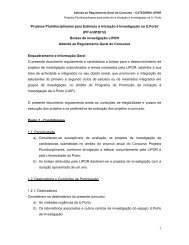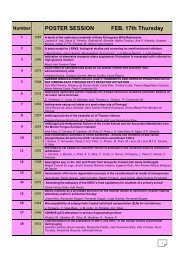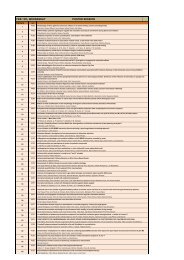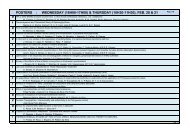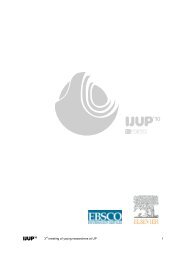IJUP08 - Universidade do Porto
IJUP08 - Universidade do Porto
IJUP08 - Universidade do Porto
- TAGS
- universidade
- porto
- ijup.up.pt
You also want an ePaper? Increase the reach of your titles
YUMPU automatically turns print PDFs into web optimized ePapers that Google loves.
Tetracyclines modulation of the osteogenic differentiation – in<br />
vitro evaluation<br />
I. Côrte-Real 1 , A. L. Marinho 1 , P. S. Gomes 1 , J. Rodrigues 1 , M. H. Fernandes 1<br />
1 Laboratório de Farmacologia e Biocompatibilidade Celular, Faculty of Dental Medicine,<br />
University of <strong>Porto</strong>, Portugal.<br />
Tetracyclines are broad-spectrum antimicrobial agents that are characterized as modulators<br />
of several biological effects in cellular mechanisms, unrelated to the inhibition of<br />
ribosomal protein synthesis – their principal antibacterial mechanism of action [1]. High<br />
chelation activity with cations may account for several of the non-antimicrobial properties,<br />
at the same time that accounts for the high affinity to mineralized tissues, namely teeth and<br />
bone [2]. Although the established affinity, little is known about the direct or indirect<br />
modulation of bone metabolism by tetracyclines.<br />
The aim of this work was to evaluate the proliferation and differentiation events of<br />
osteoblastic-induced human bone marrow cells, in the presence of therapeutic<br />
concentrations of <strong>do</strong>xycycline or minocycline (semi-synthetic tetracyclines).<br />
Human osteoblastic cells were grown for 35 days, in the presence of <strong>do</strong>xycycline (1-25<br />
µg/ml) or minocycline (1-50 µg/ml), on the surface of standard tissue culture plates. Cell<br />
cultures were evaluated for proliferation and differentiation events.<br />
Both pharmacological agents, at low concentrations (1�µg/ml), reported an increased cell<br />
proliferation. After an initial lag phase, the increased cell growth was verified in<br />
association with expression of high levels of alkaline phosphatase and a proportional<br />
increased amount of mineralized extracellular matrix. Exposure to 5 µg/ml of <strong>do</strong>xycycline<br />
induced similar results, while the same concentration of minocycline impaired osteoblastic<br />
function. Higher levels of both tetracyclines greatly impaired cell proliferation and<br />
function in a <strong>do</strong>se-dependent way.<br />
Currently, characterization of tetracyclines’ influence during the in vitro osteogenic<br />
development is being evaluated by flow cytometric analysis of the stromal precursor cell<br />
marker STRO-1 and alkaline phosphatase expression, by osteoblastic-derived human bone<br />
marrow cells. This <strong>do</strong>uble staining allows to differentiate between four STRO-1/alkaline<br />
phosphatase subsets, which correspond to specific osteogenic differentiation stages.<br />
Overall, the treatment of human osteoblastic cells with low concentrations of <strong>do</strong>xycycline<br />
or minocycline induced cell proliferation without impairing functional activity, analyzed<br />
by alkaline phosphatase activity and extent of matrix mineralization. Its therapeutic usage<br />
might combine a targeted antimicrobial activity into the bone tissue with the induction of<br />
osteoblastic proliferation, without interfering with cell-specific biological activity. Flow<br />
cytometry analysis will contribute to evaluate tetracyclines influence in cell behavior, at<br />
different stages of the osteogenic differentiation.<br />
References:<br />
[1] Nelson, M. (1998), Chemical and Biological Dynamics of Tetracyclines. Adv Dent Res, 12, 5-<br />
11.<br />
[2] White, J., Pearce, F. (1982), Characterization of chlortetracycline as a calcium ionophore.<br />
Biochemistry, 21, 6309-6312.<br />
199





